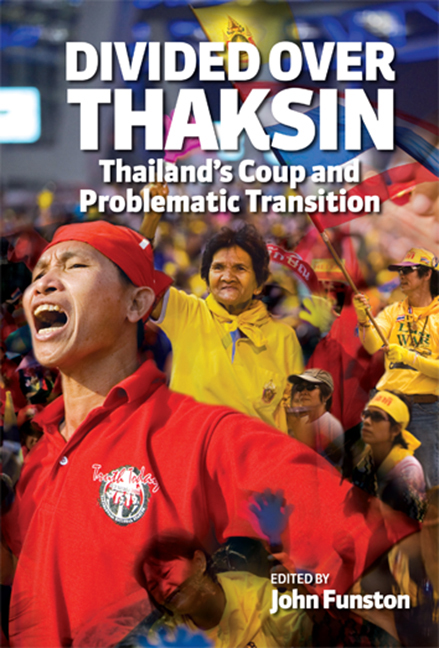Book contents
- Frontmatter
- Contents
- List of Tables and Figures
- List of Contributors
- Preface
- Introduction
- 1 Political Contests in the Advent of Bangkok's 19 September Putsch
- 2 The Tragedy of the 1997 Constitution
- 3 The NESAC, Civil Society, Good Governance and the Coup
- 4 Military Coup and Democracy in Thailand
- 5 Deconstructing the 2007 Constitution
- 6 Thailand's 2007 Constitution and Re-Emerging Democracy: Will Political Polarization Continue?
- 7 Untying the Gordian Knot: The Difficulties in Solving Southern Violence
- 8 Another Country: Reflections on the Politics of Culture and the Muslim South
- 9 Governance in the South: Is Decentralization an Option?
- 10 Tradition and Reform in Islamic Education in Southern Thailand
- 11 The Economy under the Thaksin Government: Stalled Recovery
- 12 The Thai Economy after the Coup
- 13 The Impact of Political Uncertainty on Business
- Index
8 - Another Country: Reflections on the Politics of Culture and the Muslim South
Published online by Cambridge University Press: 21 October 2015
- Frontmatter
- Contents
- List of Tables and Figures
- List of Contributors
- Preface
- Introduction
- 1 Political Contests in the Advent of Bangkok's 19 September Putsch
- 2 The Tragedy of the 1997 Constitution
- 3 The NESAC, Civil Society, Good Governance and the Coup
- 4 Military Coup and Democracy in Thailand
- 5 Deconstructing the 2007 Constitution
- 6 Thailand's 2007 Constitution and Re-Emerging Democracy: Will Political Polarization Continue?
- 7 Untying the Gordian Knot: The Difficulties in Solving Southern Violence
- 8 Another Country: Reflections on the Politics of Culture and the Muslim South
- 9 Governance in the South: Is Decentralization an Option?
- 10 Tradition and Reform in Islamic Education in Southern Thailand
- 11 The Economy under the Thaksin Government: Stalled Recovery
- 12 The Thai Economy after the Coup
- 13 The Impact of Political Uncertainty on Business
- Index
Summary
A country in Southeast Asia: armed soldiers occupy Buddhist temple compounds protected by sandbags and barbed wire to protect themselves from insurgent attacks. The same security forces use sniffer dogs to search the homes and schools of local Muslims, well knowing that this is deeply offensive. Militants, some say inspired by perverted notions of the Islamic faith, behead victims, seemingly in emulation of so-called “jihadists” elsewhere. There appears to be some mercy though — the beheadings take place after death. Young men, suspected of insurgent activity are released from custody and “disappear”. The whispered talk of the town in the small tea-shops that populate the main strip is whether there will be “an attack tonight”. Welcome to the Malay-speaking “border provinces” of southern Thailand: Pattani, Narathiwat and Yala, where since 2004, over 3,000 people have died in a murky conflict between Malay-Muslim insurgents, criminal networks, and security apparatuses of the Thai state. It feels, in many ways, like another country.
For many outsiders, including myself, the deep south of Thailand has largely been a peripheral concern; studying Thailand has meant studying Buddhist and nationalist Thailand. For the most part, my own work has been motivated by an interest in how nationalism and ideology bind fissiparous social formations. Integrative and almost religious in their combined power, national identity and nationalism (the weapon and the bullet) continue to confound expectations of a post-national age. Thailand seemed to be a good example of this. This interest has led me to pursuing an overly narrow interest in the “success” of Thai nationalism and its various expressions. Events in the south of Thailand, where some form of struggle for national recognition is underway, has brought home just how misplaced such an assumption regarding Thai nation-building can be. More than that, it has introduced to much of the world, including keen observers of Thailand and Thais themselves, a largely misfitting part of that nation-state (as it is currently constituted): the Muslim majority provinces of the deep south.
On my first visit to Pattani in October 2005 I pursued an interest I was then developing in Thailand' Ministry of Culture. I visited its provincial office on the fourth floor of the Sala Jangwat, the large building that brings together in one provincial location most of the offices of the Thai state.
- Type
- Chapter
- Information
- Divided Over ThaksinThailand's Coup and Problematic Transition, pp. 110 - 123Publisher: ISEAS–Yusof Ishak InstitutePrint publication year: 2009

